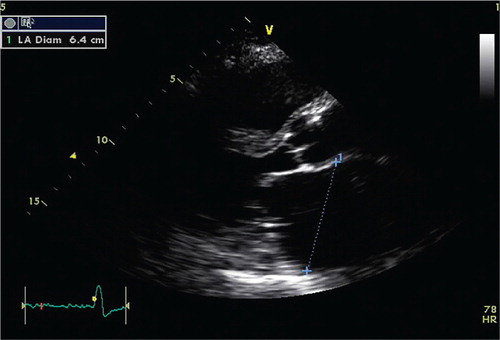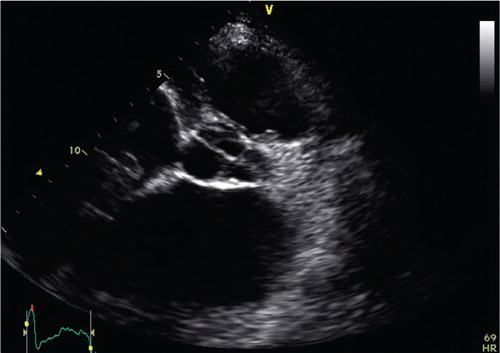Hoarseness of voice caused by the damage of the recurrent laryngeal nerve as a result of cardiac causes is known as Ortner's or cardio-vocal syndrome. This syndrome was described by Nobert Ortner, an Austrian physician, in 1897 Citation1. Initially it was thought to be due to the enlargement of the left atrium as a result of severe mitral stenosis in rheumatic heart disease. However, it was found, later, to be caused by other conditions rather than rheumatic heart disease Citation2. The accepted mechanism of this syndrome is the compression of the recurrent laryngeal nerve from the enlargement of the pulmonary artery in the window area between the aorta and ligamentum arteriosum. This condition was quite common at the beginning of last century due to a high incidence of untreated rheumatic heart disease. Although, it is very rare to see it nowadays, it still poses a treatment challenge. We would like to share our experience in diagnosing and treating a patient with Ortner's syndrome caused by severe mitral valve prolapse. To the best of our knowledge Ortner's caused by mitral valve prolapse has been reported only once.
A 75-year-old man was admitted to hospital with a history of progressive hoarseness of voice developed over three months. He also experienced progressive shortness of breath, general fatigue and lack of appetites for a three-year period. He had a history of atrial fibrillation and stroke. On examination he had irregular pulse of 70, blood pressure of 100/60, high jugular venous pressure and bilateral leg oedema. The first heart sound was muffled while the second heart sound was normal. There was a pan-systolic murmur in the mitral area radiating to the axilla. His chest was dull to percussion on the right base and there were bilateral basal crepitations. Abdominal examination revealed moderate hepatomegaly. Examination by direct laryngoscope showed evidence of left recurrent laryngeal nerve palsy. Basic blood tests were normal. Chest X-ray shows cardiomegaly and bilateral pleural effusion. Pleural fluid analysis was consistent with heart failure. Echocardiogram showed severe enlargement of left and right atriums at 6.4 and 5.5 cm, respectively, with moderate to severe mitral regurgitation and posterior leaflet prolapse. Left ventricle was of normal size while both right ventricle and ventricular septum were moderately enlarged. Both ventricles’ function was mildly reduced. There was moderate-to-severe tricuspid regurgitation and the right ventricular pressure was 55 mm Hg ( and ).
Ortner's caused by mitral valve prolapse is a very rare phenomenon and has only been reported once. There are several other cardiac causes that could lead to this problem, such as patent Ductus arteriosus, aneurysm of the aortic arch, aneurysm of the pulmonary artery, Eisenmengers syndrome, pulmonary hypertension, atrial and ventricular septal defect Citation3. Recurrent laryngeal nerve originates from the left vague nerve, and as it runs between the aorta and the pulmonary artery, it becomes very liable to injuries as the pulmonary artery dilates Citation3. Compression on other adjacent organs like the oesophagus or the lungs could lead to dysphagia or atelecasis Citation4. The treatment and prognosis of this syndrome depends on the possibilities of managing the underlying cause, for example, patients who could tolerate mitral valve surgery have a good chance of recovering their voice as a result of the reduction in the pulmonary arterial pressure. Surgery is indicated when the left atrial size exceeds 6.5 cm (so-called giant left atrium) Citation5. Our patient was judged not suitable for surgery and was treated with the combination of frusemide infusion and metalazone and his voice has recovered completely.
This patient showed that mitral valve prolapse could lead to Ortner's syndrome and that conservative treatment is effective in voice recovery, something worth keeping in mind!
Ismail I Berekat and Abdulrahman Azzu
Department of Cardiology
Gwynedd Hospital
Bangor, UK
Email: [email protected]
References
- Mulpuru SK, Vasavada BC, Punukollu GK, Patel AG. Cardio vocal syndrome: a systemic review. Heart Lung Circ. 2008; 17: 1–4.
- Mohamed A, Zain MM. Hoarseness of voice in a patient with mitral stenosis and Ortenor's syndrome. Malays J Med Sci. 2004; 11: 65–8.
- Kishan CV, Wongpraparut N, Adeleke K, Frechie P, Kotler MN. Ortner's syndrome in association with mitral valve prolapse. Clin Cardiol. 2000; 23: 295–97.
- Phua GC, Eng PC, Lim SL, Chua YL. Beyond Ortner's syndrome – unusual pulmonary complications of the giant left atrium. Ann Acad Med Singapore. 2005; 34: 642–5.
- Apostolakis E, Shuhaiber JH. The surgical management of giant left atrium. Eur J Cardiothorac Surg. 2008; 33: 182–90.

